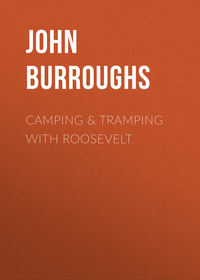 полная версия
полная версияWays of Nature
In the animal world this foresight becomes psychic intelligence, developing in man the highest form of all, reasoned intelligence. When an animal solves a new problem or meets a new condition as effectually as the tree or the body does in the cases I have just cited, we are wont to ascribe to it powers of reason. Reason we may call it, but it is reason not its own.
This universal or cosmic intelligence makes up by far the greater part of what animals know. The domestic animals, such as the dog, that have long been under the tutelage of man, of course show more independent power of thought than the uneducated beasts of the fields and woods.
The plant is wise in all ways to reproduce and perpetuate itself; see the many ingenious devices for scattering seed. In the animal world this intelligence is most keen and active in the same direction. The wit of the animal comes out most clearly in looking out for its food and safety. We are often ready to ascribe reason to it in feats shown in these directions.
In man alone does this universal intelligence or mind-stuff reach out beyond these primary needs and become aware of itself. What the plant or the animal does without thought or rule, man takes thought about. He considers his ways, I noticed that the scallops in the shallow water on the beach had the power to anchor themselves to stones or to some other object, by putting out a little tough but elastic cable from near the hinge, and that they did so when the water was rough; but I could not look upon It as an act of conscious or individual intelligence on the part of the bivalve. It was as much an act of the general intelligence to which I refer as was its hinge or its form. But when the sailor anchors his ship, that is another matter. He thinks about it, he reasons from cause to effect, he sees the storm coming, he has a fund of experience, and his act is a special individual act.
The muskrat builds its house instinctively, and all muskrats build alike. Man builds his house from reason and forethought. Savages build as nearly alike as the animals, but civilized man shows an endless variety. The higher the intelligence, the greater the diversity.
The sitting bird that is so solicitous to keep its eggs warm, or to feed and defend its young, probably shows no more independent and individual intelligence than the plant that strives so hard to mature and scatter its seed. A plant will grow toward the light; a tree will try to get from under another tree that overshadows it; a willow will run its roots toward the water: but these acts are the results of external stimuli alone.
When I go to pass the winter in a warmer climate, the act is the result of calculation and of weighing pros and cons. I can go, of I can refrain from going. Not so with the migrating birds. Nature plans and thinks for them; it is not an individual act on the part of each; it is a race instinct: they must go; the life of the race demands it. Or when the old goose covers up her nest, or the rabbit covers her young with a blanket of hair and grass of her own weaving, I do not look upon these things as independent acts of intelligence: it is the cunning of nature; it is a race instinct.
Animals, on the whole, know what is necessary for them to know – what the conditions of life have taught their ancestors through countless generations. It is very important, for instance, that amphibians shall have some sense that shall guide them to the water; and they have such a sense. It is said that young turtles and crocodiles put down anywhere will turn instantly toward the nearest water. It is certain that the beasts of the field have such a sense much more fully developed than has man. It is of vital importance that birds should know how to fly, how to build their nests, how to find their proper food, and when and where to migrate, without instruction or example, otherwise the race might become extinct.
Richard Jefferies says that most birds'-nests need a structure around them like a cage to keep the young from falling out or from leaving the nest prematurely. Now, if such a structure were needed, either the race of birds would have failed, or the structure would have been added. Since neither has happened, we are safe in concluding it is not needed.
We are not warranted in attributing to any wild, untrained animal a degree of intelligence that its forbears could not have possessed. The animals for the most part act upon inherited knowledge, that is, knowledge that does not depend upon instruction or experience. For instance, the red squirrels near me seem to know that chestnut-burs will open if cut from the tree and allowed to lie upon the ground. At least, they act upon this theory. I do not suppose this fact or knowledge lies in the squirrel's mind as it would in that of a man – as a deduction from facts of experience or of observation. The squirrel cuts off the chestnuts because he is hungry for them, and because his ancestors for long generations have cut them off in the same way. That the air or sun will cause the burs to open is a bit of knowledge that I do not suppose he possesses in the sense in which we possess it: he is in a hurry for the nuts, and does not by any means always wait for the burs to open; he frequently chips them up and eats the pale nuts.
The same squirrel will bite into the limbs of a maple tree in spring and suck the sap. What does he know about maple trees and the spring flow of sap? Nothing as a mental concept, as a bit of concrete knowledge. He often finds the sap flowing from a crack or other wound in the limbs of a maple, and he sips it and likes it. Then he sinks his teeth into the limb, as his forbears undoubtedly did.
When I was a boy and saw, as I often did on my way to school, where a squirrel had stopped on his course through the woods and dug down through two or three feet of snow, bringing up a beech-nut or an acorn, I used to wonder how he knew the nut was there. I am now convinced that he smelled it.
Why should he not? It stands the squirrel in hand to smell nuts; they are his life. He knows a false nut from a good one without biting into it. Try the experiment upon your tame chipmunk or caged gray squirrel, and see if this is not so. The false or dead nut is lighter, and most persons think this fact guides the squirrel. But this, it seems to me, implies an association of ideas beyond the reach of instinct. A young squirrel will reject a worthless nut as promptly as an old one will. Again the sense of smell is the guide; the sound-meated nut has an odor which the other has not. All animals are keen and wise in relation to their food and to their natural enemies. A red squirrel will chip up green apples and pears for the seeds at the core: can he know, on general principles, that these fruits contain seeds? Does not some clue to them reach his senses?
I have known gray squirrels to go many hundred yards in winter across fields to a barn that contained grain in the sheaf. They could have had no other guide to the grain than the sense of smell. Watch a chipmunk or any squirrel near at hand: as a friend of mine observed, he seems to be smelling with his whole body; his abdomen fairly palpitates with the effort.
The coon knows when the corn is in the milk, gaining that knowledge, no doubt, through his nose. At times he seems to know enough, too, to cut off his foot when caught in a trap, especially if the foot becomes frozen; but if you tell me he will treat his wound by smearing it with pitch or anything else, or in any way except by licking it, I shall discredit you. The practice of the art of healing by the application of external or foreign substances is a conception entirely beyond the capacity of any of the lower animals. If such a practice had been necessary for the continuance of the species, it would probably have been used. The knowledge it implies could not be inherited; it must needs come by experience. When a fowl eats gravel or sand, is it probable that the fowl knows what the practice is for, or has any notion at all about the matter? It has a craving for the gravel, that is all. Nature is wise for it.
The ostrich is described by those who know it intimately as the most stupid and witless of birds, and yet before leaving its eggs exposed to the hot African sun, the parent bird knows enough to put a large pinch of sand on the top of each of them, in order, it is said, to shade and protect the germ, which always rises to the highest point of the egg. This act certainly cannot be the result of knowledge, as we use the term; the young ostrich does it as well as the old. It is the inherited wisdom of the race, or instinct.
A sitting bird or fowl turns its eggs at regular intervals, which has the effect of keeping the yolk from sticking to the shell. Is this act the result of knowledge or of experience? It is again the result of that untaught knowledge called instinct. Some kinds of eggs hatch in two weeks, some in three, others in four. The mother bird has no knowledge of this period. It is not important that she should have. If the eggs are addled or sterile, she will often continue to sit beyond the normal period. If the continuance of the species depended upon her knowing the exact time required to hatch her eggs, as it depends upon her having the incubating fever, of course she would know exactly, and would never sit beyond the required period.
But what shall we say of Mrs. Annie Martin's story, in her "Home Life on an Ostrich Farm," of the white-necked African crow that, in order to feast upon the eggs of the ostrich, carries a stone high in the air above them and breaks them by letting it fall? This looks like reason, a knowledge of the relation of cause and effect. Mrs. Martin says the crows break tortoise-shells in the same way, and have I not heard of our own crows and gulls carrying clams and crabs into the air and dropping them upon the rocks?
If Mrs. Martin's statements are literally true, – if she has not the failing, so common among women observers, of letting her feeling and her fancies color her observations, – then her story shows how the pressure of hunger will develop the wit of a crow.
But the story goes one step beyond my credence. It virtually makes the crow a tool-using animal, and Darwin knew of but two animals, the man-like ape and the elephant, that used anything like a tool or weapon to attain their ends. How could the crow gain the knowledge or the experience which this trick implies? What could induce it to make the first experiment of breaking an egg with a falling stone but an acquaintance with physical laws such as man alone possesses? The first step in this chain of causation it is easy to conceive of any animal taking; namely, the direct application of its own powers or weapons to the breaking of the shell. But the second step, – the making use of a foreign substance or object in the way described, – that is what staggers one.
Our own crow has great cunning, but it is only cunning. He is suspicious of everything that looks like design, that suggests a trap, even a harmless string stretched around a corn-field. As a natural philosopher he makes a poor show, and the egg or the shell that he cannot open with his own beak he leaves behind. Yet even his alleged method of dropping clams upon the rocks to break the shells does not seem incredible. He might easily drop a clam by accident, and then, finding the shell broken, repeat the experiment. He is still only taking the first step in the sequence of causations.
A recent English nature-writer, on the whole, I think, a good observer and truthful reporter, Mr. Richard Kearton, tells of an osprey that did this incredible thing: to prevent its eggs from being harmed by an enforced exposure to the sun, the bird plunged into the lake, then rose, and shook its dripping plumage over the nest. The writer apparently reports this story at second-hand. It is incredible to me, because it implies a knowledge that the hawk could not possibly possess.
Such an emergency could hardly arise once in a lifetime to it or its forbears. Hence the act could not have been the result of inherited habit, or instinct, and as an original act on the part of the osprey it is not credible. The bird probably plunged into the lake for a fish, and then by accident shook itself above the eggs. In any case, the amount of water that would fall upon the eggs under such circumstances would be too slight to temper appreciably the heat.
There is little doubt that among certain of our common birds the male, during periods of excessive heat, has been known to shade the female with his outstretched wings, and the mother bird to shade her young in the same way. But this is a different matter. This emergency must have occurred for ages, and it, again, called only for the first step from cause to effect, and called for the use of no intermediate agent. If the robin were to hold a leaf or a branch above his mate at such times, that would imply reflection.
It is said that elephants in India will besmear themselves with mud as a protection against insects, and that they will break branches from the trees and use them to brush away the flies. If this is true, it shows, I think, something beyond instinct in the elephant; it shows reflection.
All birds are secretive about their nests, and display great cunning in hiding them; but whether they know the value of adaptive material, such as moss, lichens, and dried grass, in helping to conceal them, admits of doubt, because they so often use the results of our own arts, as paper, rags, strings, tinsel, in such a reckless way. In a perfectly wild state they use natural material because it is the handiest and there is really no other. The phœbe uses the moss on or near the rocks where she builds; the sparrows, the bobolinks, and the meadowlarks use the dry grass of the bank or of the meadow bottom where the nest is placed.
The English writer to whom I have referred says that the wren builds the outside of its nest of old hay straws when placing it in the side of a rick, of green moss when it is situated in a mossy bank, and of dead leaves when in a hedge-row or a bramble-bush, in each case thus rendering the nest very difficult of detection because it harmonizes so perfectly with its surroundings, and the writer wonders if this harmony is the result of accident or of design. He is inclined to think that it is unpremeditated, as I myself do. The bird uses the material nearest to hand.
Another case, which this same writer gives at second-hand, of a bird recognizing the value of protective coloration, is not credible. A friend of his told him that he had once visited a colony of terns "on an island where the natural breeding accommodation was so limited that many of them had conveyed patches of pebbles on to the grass and laid their eggs thereon."
Here is the same difficulty we have encountered before – one more step of reasoning than the bird is capable of. As a deduction from observed facts, a bird, of course, knows nothing about protective coloring; its wisdom in this respect is the wisdom of Nature, and Nature in animal life never acts with this kind of foresight. A bird may exercise some choice about the background of its nest, but it will not make both nest and background.
Nature learns by endless experiment. Through a long and expensive process of natural selection she seems to have brought the color of certain animals and the color of their environment pretty close together, the better to hide the animals from their enemies and from their prey, as we are told; but the animals themselves do not know this, though they may act as if they did. Young terns and gulls instinctively squat upon the beach, where their colors so harmonize with the sand and pebbles that the birds are virtually invisible. Young partridges do the same in the woods, where the eye cannot tell the reddish tuft of down from the dry leaves. How many gulls and terns and partridges were sacrificed before Nature learned this trick!
I regard the lower animals as incapable of taking the step from the fact to the principle. They have perceptions, but not conceptions. They may recognize a certain fact, but any deduction from that fact to be applied to a different case, or to meet new conditions, is beyond them. Wolves and foxes soon learn to be afraid of poisoned meat: just what gives them the hint it would be hard to say, as the survivors could not know the poison's deadly effect from experience; their fear of it probably comes from seeing their fellows suffer and die after eating it, or maybe through that mysterious means of communication between animals to which I have referred in a previous article. The poison probably changes the odor of the meat, and this strange smell would naturally put them on their guard.
We do not expect rats to succeed in putting a bell on the cat, but if they were capable of conceiving such a thing, that would establish their claim to be regarded as reasonable beings. I should as soon expect a fox or a wolf to make use of a trap to capture its prey as to make use of poison in any way. Why does not the fox take a stick and spring the trap he is so afraid of? Simply because the act would involve a mental process beyond him. He has not yet learned to use even the simplest implement to attain his end. Then he would probably be just as afraid of the trap after it was sprung as before. He in some way associates it with his arch-enemy, man.
Such stories, too, as a chained fox or a coyote getting possession of corn or other grain and baiting the chickens with it – feigning sleep till the chicken gets within reach, and then seizing it – are of the same class, incredible because transcending the inherited knowledge of those animals. I can believe that a fox might walk in a shallow creek to elude the hound, because he may inherit this kind of cunning, and in his own experience he may have come to associate loss of scent with water. Animals stalk their prey, or lie in wait for it, instinctively, not from a process of calculation, as man does. If a fox would bait poultry with corn, why should he not, in his wild state, bait mice and squirrels with nuts and seeds? Has a cat ever been known to bait a rat with a piece of cheese?
Animals seem to have a certain association of ideas; one thing suggests another to them, as with us. This fact is made use of by animal-trainers. I can easily believe the story Charles St. John tells of the fox he saw waylaying some hares, and which, to screen himself the more completely from his quarry, scraped a small hollow in the ground and threw up the sand about it. But if St. John had said that the fox brought weeds or brush to make himself a blind, as the hunter often does, I should have discredited him, just as I discredit the observation of a man quoted by Romanes, who says that jackals, ambushing deer at the latter's watering-place, deliberately wait till the deer have filled themselves with water, knowing that in that state they are more easily run down and captured!
President Roosevelt, in "The Wilderness Hunter," – a book, by the way, of even deeper interest to the naturalist than to the sportsman, – says that the moose has to the hunter the "very provoking habit of making a half or three-quarters circle before lying down, and then crouching with its head so turned that it can surely perceive any pursuer who may follow its trail." This is the cunning of the moose developed through long generations of its hunted and wolf-pursued ancestors, – a cunning that does not differ from that of a man under the same circumstances, though, of course, it is not the result of the same process of reasoning.
I have known a chipping sparrow to build her nest on a grape-vine just beneath a bunch of small green grapes. Soon the bunch grew and lengthened and filled the nest, crowding out the bird. If the bird could have foreseen the danger, she would have shown something like human reason.
Birds that nest along streams, such as the water-thrush and the water-ouzel, I suppose are rarely ever brought to grief by high water. They have learned through many generations to keep at a safe distance. I have never known a woodpecker to drill its nesting-cavity in a branch or limb that was ready to fall. Not that woodpeckers look the branch or tree over with a view to its stability, but that they will cut into a tree only of a certain hardness; it is a family instinct. Birds sometimes make the mistake of building their nests on slender branches that a summer tempest will turn over, thus causing the eggs or the young to spill upon the ground. Even instinct cannot always get ahead of the weather.
It is almost impossible for us not to interpret the lives of the lower animals in the terms of our own experience and our own psychology. I entirely agree with Lloyd Morgan that we err when we do so, when we attribute to them what we call sentiments or any of the emotions that spring from our moral and æsthetic natures, – the sentiments of justice, truth, beauty, altruism, goodness, duty, and the like, – because these sentiments are the products of concepts and ideas to which the brute natures are strangers. But all the emotions of our animal nature – fear, anger, curiosity, local attachment, jealousy, and rivalry – are undoubtedly the same in the lower orders.
Though almost anything may be affirmed of dogs, for they are nearly half human, yet I doubt if even dogs experience the feeling of shame or guilt or revenge that we so often ascribe to them. These feelings are all complex and have a deep root. When I was a youth, my father had a big churn-dog that appeared one morning with a small bullet-hole in his hip. Day after day the old dog treated his wound with his tongue, after the manner of dogs, until it healed, and the incident was nearly forgotten. One day a man was going by on horseback, when the old dog rushed out, sprang at the man, and came near pulling him from the horse. It turned out that this was the person who had shot the dog, and the dog recognized him.
This looks like revenge, and it would have been such in you or me, but in the dog it was probably simple anger at the sight of the man who had hurt him. The incident shows memory and the association of impressions, but the complex feeling of vengeance, as we know it, is another matter.
If animals do not share our higher intellectual nature, we have no warrant for attributing to them anything like our higher and more complex emotional nature. Musical strains seem to give them pain rather than pleasure, and it is quite evident that perfumes have no attraction for them.
The stories, which seem to be well authenticated, of sheep-killing dogs that have slipped their collars in the night and indulged their passion for live mutton, and then returned and thrust their necks into their collars before their absence was discovered, do not, to my mind, prove that the dogs were trying to deceive their masters and conceal their guilt, but rather show how obedient to the chain and collar the dogs had become. They had long been subject to such control and discipline, and they returned to them again from the mere force of habit.
I do not believe even the dog to be capable of a sense of guilt. Such a sense implies a sense of duty, and this is a complex ethical sense that the animals do not experience. What the dog fears, and what makes him put on his look of guilt and shame, is his master's anger. A harsh word or a severe look will make him assume the air of a culprit whether he is one or not, and, on the other hand, a kind word and a reassuring smile will transform him into a happy beast, no matter if the blood of his victim is fresh upon him.
A dog is to be broken of a bad habit, if at all, not by an appeal to his conscience or to his sense of duty, for he has neither, but by an appeal to his susceptibility to pain.
Both Pliny and Plutarch tell the story of an elephant which, having been beaten by its trainer for its poor dancing, was afterward found all by itself practicing its steps by the light of the moon. This is just as credible as many of the animal stories one hears nowadays.
Many of the actions of the lower animals are as automatic as those of the tin rooster that serves as a weather-vane. See how intelligently the rooster acts, always pointing the direction of the wind without a moment's hesitation. Or behold the vessel anchored in the harbor, how intelligently it adjusts itself to the winds and the tides! I have seen a log, caught in an eddy in a flooded stream, apparently make such struggles to escape that the thing became almost uncanny in its semblance to life. Man himself often obeys just such unseen currents of race or history when he thinks he is acting upon his own initiative.









